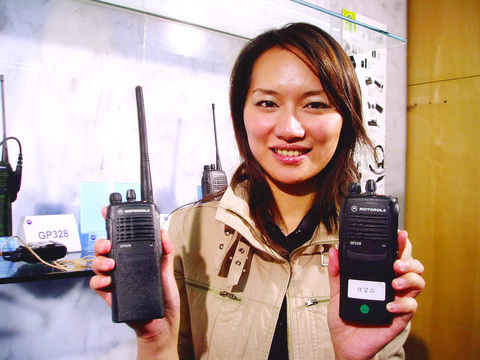Following its recent success, Motorola Inc, the world's top maker of walkie-talkies, yesterday said it would continue to safeguard its patents by cracking down on the production and sales of counterfeit products.
In September, Motorola won a patent lawsuit against Chinese manufacturer Quanzhou Fei Jie Electronic Co (
The Chinese firm has agreed to stop making and selling phony Motorola radios and conceded to other requests, the US-based company said without giving details about the agreement.

PHOTO: WANG YI-HUNG, TAIPEI TIMES
"The settlement marks a milestone in Motorola's long-term efforts to protect its patents. We will continue to curb counterfeiting of Motorola products to safeguard the interest of Motorola and our consumers," Johnny Chen (
In order to tap into the market, smaller players have copied Motorola's portable two-way radios, hurting Motorola's business and consumer's interests, Chen said.
"Counterfeit batteries are very dangerous as poorly manufactured goods can cause the walkie-talkies to malfunction during critical moments," Chen said, adding that Motorola's walkie-talkies are widely used by policemen and fire fighters.
Motorola is pursuing similar lawsuits in other regions, Chen said, although he declined to provide details.
Motorola said it had received several complaints from consumers in Taiwan about the circulation of counterfeit Motorola products -- mostly knockoffs of its batteries and popular V3 series handsets.
Most of the fake Motorola products were imported items, the company said.
Motorola does not plan to take any legal action until it has collected sufficient information and evidence, Chen said.
To ensure that consumers only get authentic Motorola products, the company has set up Motorola Genuine Outlets (MGO) in the Asia-Pacific region to sell its products.
Motorola currently operates 12 MGOs in Taiwan among 118 similar outlets around in the region.
In other developments, Motorola plans to set up 30 stores in Gome Electrical Appliances Holdings Ltd (國美電器) outlets in China this year to help increase its sales in less developed cities.
The Gome-Motorola partnership is expected to generate revenue of 3 billion yuan (US$381 million) next year, China's biggest electronics retailer said in Beijing yesterday.
It expects to sell 3 million units, accounting for 28 percent of Gome's handset sales next year.
"In the next two years, handsets offering features such as television and games will be highly sought after by consumers," Gome billionaire founder and chairman Huang Guangyu (黃光裕) said in Beijing.
Motorola is the best-selling brand in Gome's outlets, Huang said.

Intel Corp chief executive officer Lip-Bu Tan (陳立武) is expected to meet with Taiwanese suppliers next month in conjunction with the opening of the Computex Taipei trade show, supply chain sources said on Monday. The visit, the first for Tan to Taiwan since assuming his new post last month, would be aimed at enhancing Intel’s ties with suppliers in Taiwan as he attempts to help turn around the struggling US chipmaker, the sources said. Tan is to hold a banquet to celebrate Intel’s 40-year presence in Taiwan before Computex opens on May 20 and invite dozens of Taiwanese suppliers to exchange views

Application-specific integrated circuit designer Faraday Technology Corp (智原) yesterday said that although revenue this quarter would decline 30 percent from last quarter, it retained its full-year forecast of revenue growth of 100 percent. The company attributed the quarterly drop to a slowdown in customers’ production of chips using Faraday’s advanced packaging technology. The company is still confident about its revenue growth this year, given its strong “design-win” — or the projects it won to help customers design their chips, Faraday president Steve Wang (王國雍) told an online earnings conference. “The design-win this year is better than we expected. We believe we will win

Chizuko Kimura has become the first female sushi chef in the world to win a Michelin star, fulfilling a promise she made to her dying husband to continue his legacy. The 54-year-old Japanese chef regained the Michelin star her late husband, Shunei Kimura, won three years ago for their Sushi Shunei restaurant in Paris. For Shunei Kimura, the star was a dream come true. However, the joy was short-lived. He died from cancer just three months later in June 2022. He was 65. The following year, the restaurant in the heart of Montmartre lost its star rating. Chizuko Kimura insisted that the new star is still down

While China’s leaders use their economic and political might to fight US President Donald Trump’s trade war “to the end,” its army of social media soldiers are embarking on a more humorous campaign online. Trump’s tariff blitz has seen Washington and Beijing impose eye-watering duties on imports from the other, fanning a standoff between the economic superpowers that has sparked global recession fears and sent markets into a tailspin. Trump says his policy is a response to years of being “ripped off” by other countries and aims to bring manufacturing to the US, forcing companies to employ US workers. However, China’s online warriors